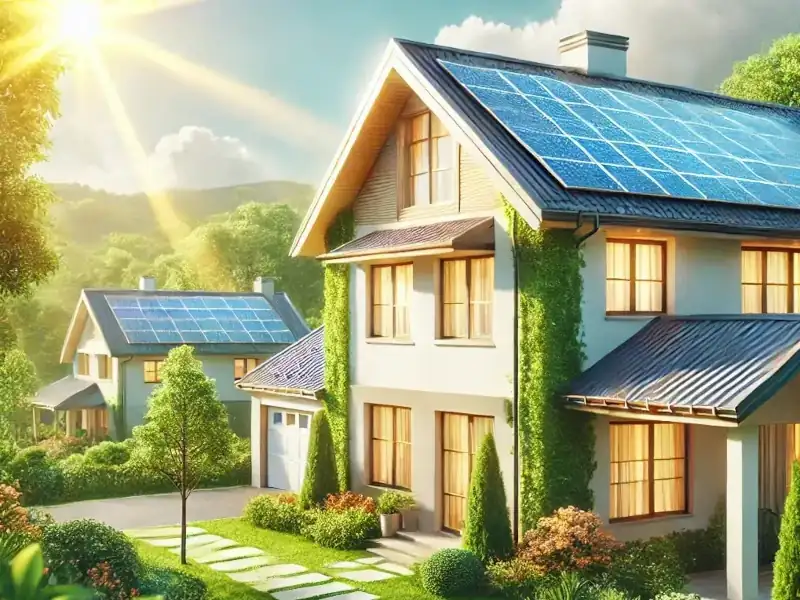The Environmental Benefits of Solar Panels for Homeowners: Are There Any Drawbacks?

Intro
Solar panels have become a popular topic of conversation, and for good reason. As homeowners look for ways to save on energy bills and make eco-friendly choices, solar energy stands out as a solution. It’s clean, renewable, and increasingly accessible. But how much do solar panels really help the environment? And are there any downsides to consider?
The environmental benefits of solar panels are significant. They reduce greenhouse gas emissions, lower reliance on finite resources, and can even help conserve water. For many, this makes them an obvious choice. However, like most technologies, they come with trade-offs. Understanding the full picture is essential before deciding if solar is right for your home.
This blog post dives into the details of solar panels’ environmental impact. We’ll explore their benefits, examine the potential drawbacks, and highlight the innovations shaping their future. By the end, you’ll have a clear understanding of how solar panels fit into a sustainable lifestyle. Ready to get started? Let’s shine some light on the subject!
Understanding Solar Panels and How They Work
Solar panels are devices that convert sunlight into electricity. They rely on photovoltaic (PV) cells, which absorb sunlight and generate an electric current through a process called the photovoltaic effect. These cells are made from semiconductors like silicon, which play a crucial role in capturing and converting energy.
A typical home solar panel setup includes the panels themselves, an inverter to convert the electricity into a usable form, and a meter to track energy production. For homeowners, this means the energy from the sun can directly power appliances, lights, and other devices, reducing dependence on traditional electricity sources.
Over the last decade, solar energy adoption has surged. According to recent data, millions of homes now use solar panels, contributing to a greener and more sustainable energy landscape. This growing popularity underscores their appeal as a renewable energy option for everyday use.
The Environmental Benefits of Solar Panels
- Reduction in Greenhouse Gas Emissions
Using solar panels reduces carbon dioxide emissions by replacing fossil fuel-based energy. On average, a residential solar panel system can prevent several tons of CO₂ from entering the atmosphere each year. - Decreasing Dependence on Nonrenewable Resources
Solar panels harness energy from the sun, an infinite resource. This reduces reliance on limited resources like coal, oil, and natural gas, preserving them for future generations. - Conservation of Water Resources
Unlike traditional power plants that use large amounts of water for cooling, solar panels require little to no water to generate electricity. This helps conserve freshwater resources and prevents ecosystem disruptions. - Supporting Local Ecosystems
By reducing air pollution, solar panels contribute to cleaner air and healthier environments for plants, animals, and people. This benefit is especially noticeable in areas with high levels of industrial emissions. - Promotion of Energy Independence
Solar panels allow homeowners to generate their own electricity, reducing demand on centralized grids. This makes communities more resilient during outages and lowers the overall strain on public energy systems.
Are There Environmental Drawbacks to Solar Panels?
While the benefits of solar panels are compelling, there are some environmental challenges to consider.
- Production-Related Emissions
Manufacturing solar panels involves mining raw materials like silicon, silver, and other metals. These processes consume energy and produce emissions. However, most solar panels offset their production footprint within a few years of use. - Recycling and Disposal Challenges
Solar panels have a lifespan of 20–30 years. At the end of their use, they can become waste. Recycling systems for panels are still developing, which can pose environmental challenges. - Land Use and Habitat Disruption
Large-scale solar farms require significant land, which can disrupt local habitats. For rooftop installations, this issue is less relevant, but it’s an important consideration for the broader solar industry. - Material Extraction Concerns
The mining of materials used in solar panels can lead to environmental degradation if not managed responsibly. Efforts are underway to make the process more sustainable, but challenges remain.
Weighing the Trade-Offs: Is It Worth It for Homeowners?
Solar panels represent a significant investment, but they come with both environmental and financial returns. Home systems typically offset the carbon emissions from their production within two to three years, and they provide clean energy for decades.
Financial incentives, like tax credits and rebates, further enhance their appeal. Additionally, by reducing dependence on traditional energy grids, solar panels contribute to a more stable and sustainable energy future for communities. For most homeowners, the benefits outweigh the drawbacks, especially as recycling and production processes improve.
Future Innovations in Solar Technology
The future of solar panels looks bright. Advances in technology are making them more efficient, durable, and environmentally friendly. For example, researchers are developing solar panels that use fewer raw materials while producing more electricity.
Improved recycling methods are also on the horizon. These innovations aim to create a circular economy where old panels are dismantled, and their materials are reused in new systems. As the industry evolves, solar panels are set to become even more sustainable and accessible.
Higher-efficiency designs are another exciting development. Emerging technologies promise to generate more power from the same amount of sunlight, reducing the number of panels needed per home. These advancements will make solar energy an even better option for homeowners seeking clean, affordable energy.
Conclusion
Solar panels provide clear environmental benefits by reducing emissions, conserving resources, and promoting sustainability. While there are challenges, such as production emissions and end-of-life waste, ongoing advancements are addressing these issues.
For homeowners, solar panels offer a chance to make a meaningful impact on the environment while enjoying energy savings. By staying informed and supporting innovations in the field, individuals can embrace solar energy with confidence.
Switching to solar is not just about saving money—it’s about contributing to a healthier planet.






